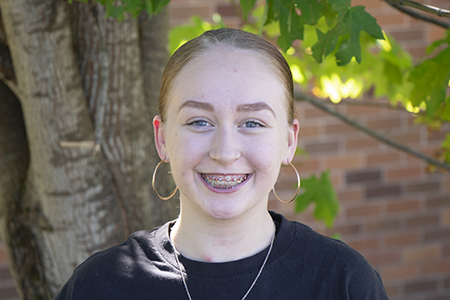Pronouns: The First Step to Respect
The consistent and proper use of pronouns can begin to create a more accepting world for those who identify with different genders than assigned at birth.
February 3, 2021
He and she. These are the pronouns that have traditionally been used, no matter what someone felt inside. Two boxes, and everybody was categorized into those boxes based on their appearance, rather than for who they truly are.
Often, when speaking about a person, people typically use only these two pronouns, which imply gender without knowing what pronouns the person uses. However, it should become universal for people everywhere and of any age to mention their pronouns when introducing themselves.
I think it is important that we stop taking one look at someone and assuming their identity based on which clothes they choose to wear or how they otherwise appear.
What different pronouns are there?
There are many different pronouns that an individual can use.
As far as what pronouns are used, the most common ones are he/him, she/her, they/them, ze/hir, or just going by their name. There are many more pronouns people could go by, but the only way to truly know a person’s pronouns is by asking them.
How do you know what pronouns someone goes by?
Ask them! You should never assume somebody’s pronouns based on their appearance. Nowadays, dressing more “masculine” does not always mean you identify as a male, and if you dress more “feminine” that doesn’t always mean you identify as a female.
Pronouns are a big part of respecting a person’s identity and choosing to ignore someone’s wishes is choosing to not respect them. Asking for someone’s pronouns ensures that we build a gender-inclusive world where people can be perceived as they perceive themselves.
Why do people want to use gender-neutral pronouns?
With the common he and she pronouns there comes a lot of expectations, and for some people, specific gender pronouns can feel limiting to self-expression and self-identity. Using gender-neutral pronouns can also be a big step for people to start expressing more self-love and self-acceptance.
Who can use gender-neutral pronouns?
For anyone who feels more comfortable navigating a world without gender expectations, gender-neutral pronouns can be a good fit for you. There is no identity you must claim in order to use genderless language.
Why is it important to know which pronouns a person prefers?
You can’t know which pronouns someone prefers by looking at them, so the best way you can respect their identity is by asking.
When you use a wrong pronoun to refer to someone it may make them feel invalidated, alienated, or dismissed, and often all of the above. It is a privilege to not have to worry about which pronouns someone is going to associate with your gender, so if you have this privilege, don’t go and disrespect someone who doesn’t.
So, I am supposed to ask everyone I meet what pronouns they prefer?
Correct. Everyone deserves respect and asking the pronouns of everyone you meet is a very important task when it comes to respecting people’s identity.
If I am cisgender do I still have to use pronouns?
Even if your gender identity matches the sex you were assigned at birth, there is no way to tell what someone’s gender is. There is no way to look cisgender, gender fluid, or any other way.
When cisgender people use pronouns it allows transgender, genderfluid, or nonbinary individuals to feel more comfortable in stating what theirs are. It’s a process that simply allows everyone to feel comfortable.
What if I don’t know that much about non-binary gender identities?
That’s okay. You don’t need to know a lot about non-binary genders to respect someone who identifies with non-binary gender, but taking the time to educate yourself and learn more about it can make them feel even more respected.
So, if someone doesn’t prefer him or her, that person will use they/them, right?
No, not every person who uses gender-neutral pronouns uses the same pronouns as another person who uses gender-neutral pronouns.
What if I or another person addresses someone with the wrong pronoun?
It is okay if you misspeak when talking about someone’s pronouns, but the important thing is correcting yourself as soon as you realize.
If you ever hear someone using the wrong pronouns for someone whose pronouns you know they prefer, hold them accountable and correct them. Continue to correct someone if they continuously use the wrong pronouns for an individual.
Pronouns can be confusing if you do not know an extensive amount of information about which ones to use or how to go about using them. That is where the internet comes in handy. Researching and making an effort to understand pronouns is a huge step to create an environment where people can be free to express themselves as who they truly are.





